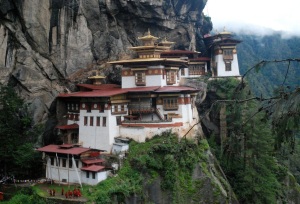Explore Bhutan
 Bhutan-A place of frozen water.                                                                                                                           Is a small landlocked state in South Asia known for its  steep and high mountains crisscrossed by a network of swift rivers. The country’s culture and tradition attracts a lot of  tourists.Bhutan is referred to as The Last Shangri-la because of its largely unspoiled natural environment and cultural heritage. Bhutan includes charms of lovely landscape, heart-warming monasteries and stunning mountain ranges for you. So, move ahead and make yourself ready to grab this unique experience with Shikhar Travels. The important centres of tourism are found inBhutan’s capital-Thimphu, and in the western city ofParo, nearIndia. Taktshang, a cliff side monastery in theParoValley is one of the country’s main attractions.
Bhutan-A place of frozen water.                                                                                                                           Is a small landlocked state in South Asia known for its  steep and high mountains crisscrossed by a network of swift rivers. The country’s culture and tradition attracts a lot of  tourists.Bhutan is referred to as The Last Shangri-la because of its largely unspoiled natural environment and cultural heritage. Bhutan includes charms of lovely landscape, heart-warming monasteries and stunning mountain ranges for you. So, move ahead and make yourself ready to grab this unique experience with Shikhar Travels. The important centres of tourism are found inBhutan’s capital-Thimphu, and in the western city ofParo, nearIndia. Taktshang, a cliff side monastery in theParoValley is one of the country’s main attractions.
Thimphu                                                                                                                                                            Is the capital of Bhutan. It comprises of important political buildings including the National Assembly andDechencholingPalace. During Autumn, Tsechu festival is an important festival being held in the courtyards of the Tashichhoe Dzong in Timphu. Spread out along theWangChuuRiver,Thimphu enjoys great weather with ample precipitation.
Paro                                                                                                                                                                       Is a place bordered by Haa dzongkhag to the west,Tibet to the north,Thimphu to the east, and Chukha dzongkhag to the south.   Bhutan’sInternationalAirport is located at Paro.ParoAirport is a beautiful small green-roofed facility in a valley, served only by Drukair fromIndia. Taksang Monastery, Kichu Lang, Drukgyel Dzong are the important places to see in Paro.Taktshang, Kyichu Lhakhang, Drukgyel Dzong, Paro Town, Rinpung Dzong, The National Museum of Bhutan are some of the important cultural sites of Paro. Paro is exceptionally scenic and serene!
Punakha                                                                                                                                                           Was the capital of Bhutan until the year 1955. Its serene atmosphere attracts tourists and visitors from all over the world. One must visit the majestic Punakha Dzong, which is cradled on an island created by the confluence of River Mo Chuu and River Pho Chuu. Punakha valley is famous inBhutan for rice farming. Besides being home to ancient relics, Punakha also serves as a winter residence for the monastic body.
The Wildlife of Bhutan                                                                                             Throughout thekingdom of Bhutan, more than 770 species of plants are known to exist. TheBengaltiger, Greater One-horned Rhinoceros, clouded leopard, golden langur and the sloth bear are found in the south. Grey langur tiger, Indian leopard, goral, serow, mixed conifer are found in the temperature zone. In the north, the alpine habitats of the great Himalayan range are home to the snow leopard, blue sheep, antelope and Himalayan musk deer.
Bhutanese tradition is deeply steeped in its Buddhist heritage. Hinduism is the second dominant religion in Bhutan.Inorder to strenghten Bhutan’s identity as an independent country, Bhutanese law requires all Bhutanese citizens to wear the national dress in public areas and as formal wear.Rice, buckwheat, maize are the staple foods of the country. The local diet also includes pork, beef, yak meat, chicken, and mutton.Popular beverages include butter tea, tea, rice wine and beer. Bhutanis the only country in the world to have banned the sale of tobacco under its Tobacco Act of 2010.                                                                                                                                                 Bhutanexperiences five distinct seasons-summer, monsoon, autumn, winter and spring.Western Bhutanhas the heavier monsoon rains; southern Bhutanhas hot humid summers and cool winters; central and eastern Bhutanis temperate and drier than the west with warm summers and cool winters.
OMG its like this forum read my mind. The other day, I was just imagining haivng ( if not a HUGGGGGEE) atleast a good library where everyone in Thimphu would bring in their used books and donate it to the library and then everyone would have a membership.Just imagine the amount we would be EDUCATING OUR YOUTH! A small coffee and snack bar with private reading areas with some nice bhutanese instrumental songs in the background and work space for students/everyone to come and do their homework and office work . Also there should be shelves where personal poetry, essays and any sort of literary work written by Bhutanese should be displayed. In fact I was just thinking how much of creative work and research Bhutanese within and abroad must have done. It would be great to showcase these work; thesis, films, artwork, poetry and so on.*sigh* dreaming too big! lol. It would be WONDERFUL for the Bhutanese community to come together, converse about current issue, bond with people within our own community and enjoy our wonderful country.Also Mrs.Pek, I definitely agree with you. Whatever the country does, whether it is economically sound or not, the education of our younger generation is uncompromisable. It is like compromising the health and future of our country. Reading is not like academic studies where you are forced to read heavy materials. It is knowledge beyond institutional borders. It is about expanding your political , social and moral imagination beyond limits we could ever imagine. +4